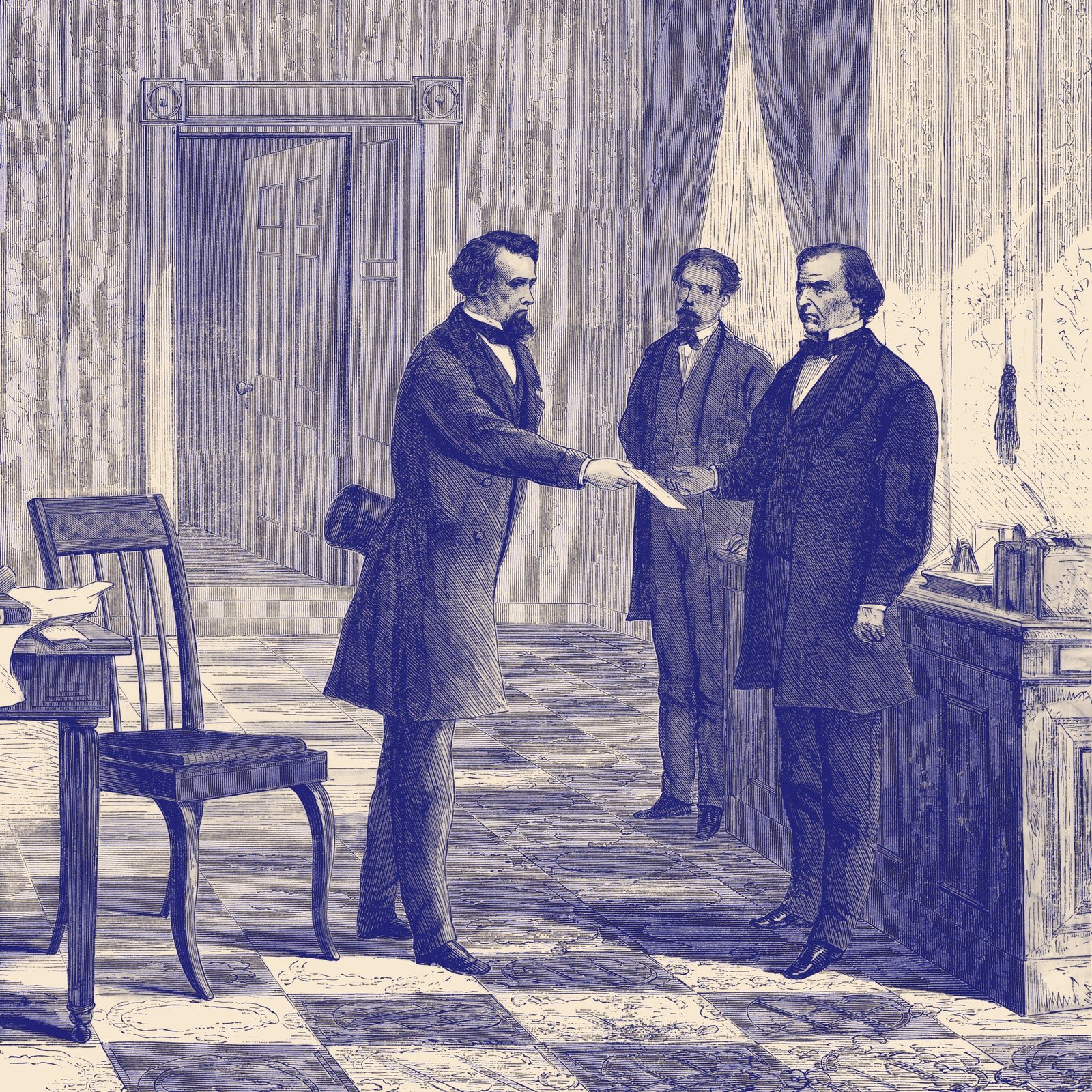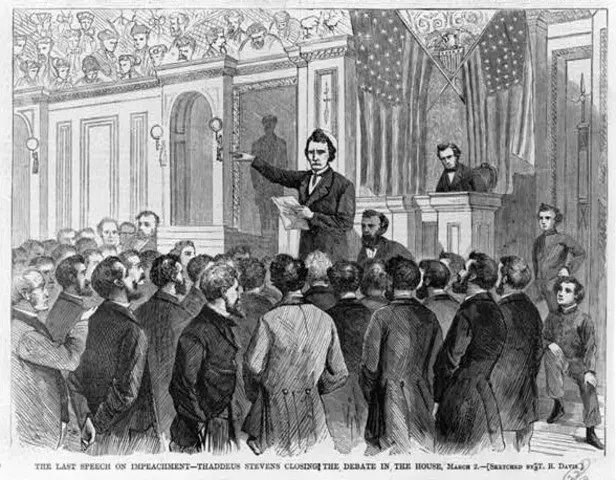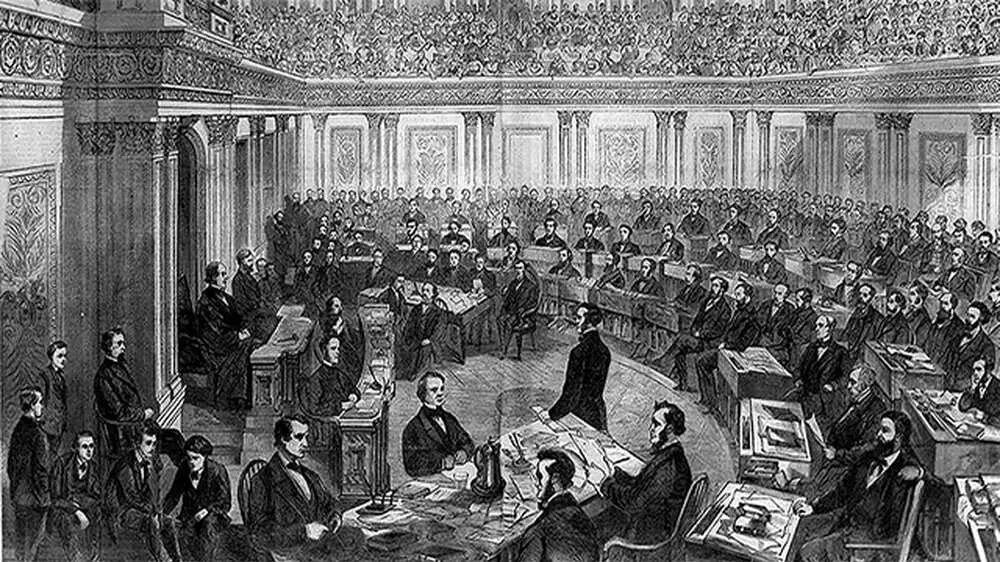Impeachment Trial Of Andrew Johnson Begins
For the first time in U.S. history, the impeachment trial of an American president gets underway in the U.S. Senate. President Andrew Johnson, reviled by the Republican-dominated Congress for his views on Reconstruction, stood accused of having violated the controversial Tenure of Office Act, passed by Congress over his veto in 1867.
At the outbreak of the Civil War in 1861, Johnson, a U.S. senator from Tennessee, was the only senator from a seceding state who remained loyal to the Union. Johnsons political career was built on his defense of the interests of poor white Southerners against the landed classes; of his decision to oppose secession, he said, Damn the negroes; I am fighting those traitorous aristocrats, their masters. For his loyalty, President Abraham Lincoln appointed him military governor of Tennessee in 1862, and in 1864 Johnson was elected vice president of the United States.
READ MORE: How Many US Presidents Have Faced Impeachment?
In 1875, after two failed bids, Johnson won reelection to Congress as a U.S. senator from Tennessee. He died less than four months after taking office at the age of 66. Fifty-one years later, the U.S. Supreme Court declared the Tenure of Office Act unconstitutional in its ruling in Myers v. United States.
Why Were Radical Republicans Angry Over Lincoln And Johnson’s Reconstruction Plans
Radical Republicans were upsetplanswereradicalrepublicans
The key difference between the Radical Republicans and President Andrew Johnson’s plan over Reconstruction is that Johnson wanted a lenient plan, but the Radicals wanted a harsh plan.
Also, what was the Radical Republicans plan for reconstruction? The Radical Republicans‘ reconstruction offered all kinds of new opportunities to African Americans, including the vote , property ownership, education, legal rights, and even the possibility of holding political office. By the beginning of 1868, about 700,000 African Americans were registered voters.
Just so, how did the radical Republicans respond to Johnson’s policies?
They believed the South should be punished for the war. How did radical republicans respond to Johnson’s policies? They passed the Civil Rights Bill which gave african americans citizenship. After Johnson vetoed, the republicans tried to get it written into the constitution as the 14th amendment, and congress approved.
What were the 3 major issues of reconstruction?
Reconstruction encompassed three major initiatives: restoration of the Union, transformation of southern society, and enactment of progressive legislation favoring the rights of freed slaves.
Early Life And Education
Stevens was born in Danville, Vermont on April 4, 1792. He was the second of four children, all boys, and was named to honor the Polish general who served in the American Revolution, Thaddeus Kociuszko. His parents were Baptists who had emigrated from Massachusetts around 1786. Thaddeus was born with a club foot which, at the time, was seen as a judgment from God for secret parental sin. His older brother was born with the same condition in both feet. The boys father, Joshua Stevens, was a farmer and cobbler who struggled to make a living in Vermont. After fathering two more sons , Joshua abandoned the children and his wife Sarah . The circumstances of his departure and his subsequent fate are uncertain; he may have died at the Battle of Oswego during the War of 1812.
Sarah Stevens struggled to make a living from the farm even with the increasing aid of her sons. She was determined that her sons improve themselves, and in 1807 moved the family to the neighboring town of Peacham, Vermont, where she enrolled young Thaddeus in the Caledonia Grammar School . He suffered much from the taunts of his classmates for his disability. Later accounts describe him as wilful, headstrong with an overwhelming burning desire to secure an education.
Read Also: What 7 Republicans Voted To Impeach
The End Of The Movement
- The Radical movement was coming to an end, its agenda superseded by concerns about the economy, which had been hit by recession in 1873.
- In the Congressional elections of 1874, the Democrats took control. Southern State legislatures gradually reverted to the Democrats as well, and the reforms of the Radical Republicans began to be rolled back.
- In the highly controversial 1876 presidential election, Republican Rutherford B. Hayes managed to win power despite losing the popular vote, when he promised Southern States that all federal troops would be withdrawn.
- After this, civil rights were no longer enforced in the South, and the former Confederate states brought in the so-called Jim Crow laws.
- These laws allowed the segregation of white and black people, and although they did not explicitly state that black people could not vote, the conditions that had to be met in order to vote were disproportionately unfavourable to African-Americans. The inequality imposed by the Jim Crow laws persisted for almost a century.
Image sources:
Road To The Presidency

At the Republican presidential convention the same year in Chicago, the delegates were divided into three principal camps: the Stalwarts , who backed former president Ulysses S. Grant; the Half-Breed supporters of Maine Sen. James G. Blaine; and those committed to Secretary of the Treasury John Sherman. Tall, bearded, affable, and eloquent, Garfield steered fellow Ohioan Shermans campaign and impressed so many with his largely extemporaneous nominating speech that he, not the candidate, became the focus of attention. As the chairman of the Ohio delegation, Garfield also led a coalition of anti-Grant delegates who succeeded in rescinding the unit rule, by which a majority of delegates from a state could cast the states entire vote. This victory added to Garfields prominence and doomed Grants candidacy. Grant led all other candidates for 35 ballots but failed to command a majority. On the 36th ballot the nomination went to a dark horse, Garfield, who was still trying to remove his name from nomination as the bandwagon gathered speed.
Also Check: How Many Republicans Are Needed To Vote For Impeachment
Why Were The Radical Republicans So Powerful
Radical Republicans werepowerful
People Also Asked, What did the radical republicans do?
The Radical Republicans were a faction of the Republican Party during the American Civil War. They were distinguished by their fierce advocacy for the abolition of slavery, enfranchisement of black citizens, and holding the Southern states financially and morally culpable for the war.
Also know, how did the radical Republicans differ from the Republican majority? ? Moderate Republicans, and the majority of the Republican Party, wanted assurance that slavery and treason were dead. Radical Republicans, on the other hand, hoped that reconstruction could achieve black equality, free land distribution to former slaves, and voting rights for African Americans.
Contents
Railroad Subsidies And Payoffs
Every Southern state subsidized railroads, which modernizers believed could haul the South out of isolation and poverty. Millions of dollars in bonds and subsidies were fraudulently pocketed. One ring in North Carolina spent $200,000 in bribing the legislature and obtained millions of state dollars for its railroads. Instead of building new track, however, it used the funds to speculate in bonds, reward friends with extravagant fees, and enjoy lavish trips to Europe. Taxes were quadrupled across the South to pay off the railroad bonds and the school costs.
Also Check: Why Are Republicans Wearing Blue Ties
How Did Lincoln And Johnson Approach Reconstruction Differently
How did Lincoln and Johnson approach Reconstruction differently? Lincoln and Johnson both supported the Ten Percent Plan, which allowed each rebellious state to return to the Union as soon as 10 percent of its voters had taken a loyalty oath and the state had approved the Thirteenth Amendment, abolishing slavery.
One Of The Worst Us Presidents
While Kennedy called the decision to vote to acquit Johnson a profile in courage, the larger narrative of Johnsons presidency is not a good one. He made it easier for Southern states to reenter the Union and pardoned the Vice President of the Confederacy, perhaps helping to sew the nation back together but doing little to address the plight of African Americans in the South. He was a racist who opposed the Emancipation Proclamation and blocked efforts to help Southern blacks find their footing post-slavery.
He utterly failed to make a satisfying and just peace because of his racist views, his gross incompetence in federal office, and his incredible miscalculation of public support for his policies, wrote Elizabeth Varon, a history professor at the University of Virginia. He tried to preempt and then undermine Congressional Reconstruction by deeming the Republican experiment in black citizenship a failure, and by portraying former Confederates as victims of Republican misrule.
It was also an unhappy decision for the seven Republicans who voted to acquit him. They might have saved the powerful executive system, but they lost their jobs. None were reelected to the Senate and they faced personal repercussions as well. According to a Senate history, Ross was ostracized and his family fell into poverty when they returned to Kansas.
CORRECTION: This story has been updated to reflect that Civil War was not yet over when Lincoln was re-elected.
Don’t Miss: Did Republicans Riot After Obama Was Elected
What Did The Radical Republicans Want
Radical Republicans believed that African Americans deserved immediate freedom from bondage and should receive the same rights as whites. Radical Republicans favored granting civil rights to African Americans for various reasons. Some radicals truly believed that African Americans were equals to the whites.
Attacks Against Native Americans In California And Oregon Country
Taking 16 men, Frémont split his party again, arriving at Sutters Fort in the on December 9. Frémont promptly sought to stir up patriotic enthusiasm among the American settlers there. He promised that if war with Mexico started, his military force would protect the settlers. Frémont went to , to talk with the American consul, , and Mexican commandant, under the pretext of gaining fuller supplies. In February 1846, Frémont reunited with 45 men of his expedition party near , giving the United States a formidable military army in California. Castro and Mexican officials were suspicious of Frémont and he was ordered to leave the country. Frémont and his men withdrew and camped near the summit of what is now named . Headstrong and with much audacity, Frémont raised the United States Flag in defiance of Mexican authority.
Playing for time, after a four-day standoff and Castro having a superior number of Mexican troops, Frémont and his men went north to Oregon, executing the along the way. Estimates of the casualties vary. Expedition members Thomas E. Breckenridge and Thomas S. Martin claim the number of Native Americans killed as 120150 and over 175 respectively, but the eyewitness Tustin claimed that at least 600700 Native Americans were killed on land, with another 200 or more dying in the water. There are no records of any expedition members being killed or even wounded in the massacre., one of the mounted attackers, later stated, It was a perfect butchery.
You May Like: What Republicans Are Running For Governor In Nevada
Answer To Review Question
Dont Miss: What Republicans Voted To Impeach The President
The Radical Republicans After The Death Of Thaddeus Stevens

Thaddeus Stevens died on August 11, 1868. After lying in the state in the rotunda of the U.S. Capitol, he was buried in a cemetery in Pennsylvania he had chosen as it allowed burials of both White and Black people.
The faction of Congress he had led continued, though without his fiery temperament much of the fury of the Radical Republicans subsided. Plus, they tended to support the presidency of Ulysses S. Grant, who took office in March 1869.
Also Check: What Is Trump’s Approval Rating Among Republicans
Why Did The Presidential Reconstruction Fail
However, Reconstruction failed by most other measures: Radical Republican legislation ultimately failed to protect former slaves from white persecution and failed to engender fundamental changes to the social fabric of the South. Reconstruction thus came to a close with many of its goals left unaccomplished.
Why Did President Johnson And The Radical Republicans Fought So Fiercely Over Reconstruction
The Radical Republicans opposed Lincolns plan because they thought it too lenient toward the South. Radical Republicans believed that Lincolns plan for Reconstruction was not harsh enough because, from their point of view, the South was guilty of starting the war and deserved to be punished as such.
Don’t Miss: How Many Seats Do Republicans Hold In Congress
Andrew Johnsons Impeachment And The Legacy Of The Civil War
He started as a hero and ended as the impersonation of the tyrannical slave power.
On April 15, six weeks after Andrew Johnson was sworn in as vice president of the United States, Abraham Lincoln was assassinated. Had the assassin’s plot gone as planned, Johnson, Ulysses S. Grant, and Secretary of State William Seward would have also been killed. As it turned out, co-conspirator George Atzerodt, who had stalked the vice president, lost his nerve at the last minute.
A few hours after Lincoln’s death, Chief Justice Salmon P. Chase swore Johnson in as President of the United States. Republicans were relieved that Johnson had not been killed and could provide continuity; they thought that he would be putty in their hands and would follow the dictates of Republican congressional leaders. They were mistaken. And the resulting conflict between president and Congress led to the first presidential impeachment in American history.
In Johnson’s mind, the issue of what to do with the defeated Southern states was simple: impose conditions upon their return to full standing, such as the irrevocable abolition of slavery but do not impose black suffrage as a condition of readmission.
Journal Universel
Many Senate Republicans had decided to make it a close vote but not a conviction.
Republican Party Presidential Candidate
In 1856, Frémont was the first presidential candidate of the new . The Republicans, whose party had formed in 1854, were united in their opposition to the Pierce Administration and the spread of slavery into the West. Initially, Frémont was asked to be the Democratic candidate by former Virginia Governor and the powerful Preston family. Frémont announced that he was for Free Soil Kansas and was against the enforcement of the 1850 . Republican leaders , , and were able to get Frémont to join their political party. Seeking a united front and a fresh face for the party, the Republicans nominated Frémont for president over other candidates, and conservative of New Jersey, for vice president, at their June 1856 convention held in Philadelphia. The Republican campaign used the slogan Free Soil, Free Men, and Frémont to crusade for free farms and against the . Frémont, popularly known as The Pathfinder, however, had voter appeal and remained the symbol of the Republican Party. The Democratic Party nominated .
Also Check: When Will Republicans Do The Right Thing
Recommended Reading: Is There Any Republicans Running For President Besides Trump
Why Did Radical Republicans Disagree With This Proclamation
The Radical Republicans opposed Lincolns plan because they thought it too lenient toward the South. Radical Republicans believed that Lincolns plan for Reconstruction was not harsh enough because, from their point of view, the South was guilty of starting the war and deserved to be punished as such.
President Andrew Johnson Impeached
The U.S. House of Representatives votes 11 articles of impeachment against President Andrew Johnson, nine of which cite Johnsons removal of Secretary of War Edwin M. Stanton, a violation of the Tenure of Office Act. The House vote made President Johnson the first president to be impeached in U.S. history.
At the outbreak of the Civil War in 1861, Andrew Johnson, a senator from Tennessee, was the only U.S. senator from a seceding state who remained loyal to the Union. In 1862, President Abraham Lincoln appointed him military governor of Tennessee, and in 1864 he was elected vice president of the United States. Sworn in as president after Lincolns assassination in April 1865, President Johnson enacted a lenient Reconstruction policy for the defeated South, including almost total amnesty to ex-Confederates, a program of rapid restoration of U.S.-state status for the seceded states, and the approval of new, local Southern governments, which were able to legislate Black Codes that preserved the system of slavery in all but its name.
READ MORE:;How Many U.S. Presidents Have Faced Impeachment?
Also Check: How Did The Republicans Take Control Of Congress
Did The Radical Republicans In Congress Repeatedly Try To Impeach President Andrew Johnson
Who are the experts?Our certified Educators are real professors, teachers, and scholars who use their academic expertise to tackle your toughest questions. Educators go through a rigorous application process, and every answer they submit is reviewed by our in-house editorial team.
The Radical Republicans did try to impeach President Johnson. The Radical Republicans believed that President Johnson was blocking attempts to help former slaves as they adjusted to being freed. They were upset that President Johnson had vetoed the Civil Rights Act of 1866 that gave full citizenship to African Americans….
What Did Lincolns 10 Percent Plan For Reconstruction Require States To Do

What did Lincolns 10 Percent Plan for Reconstruction require states to do? Write a constitution that abolished slavery and provided for black education. They wanted to make sure that southern states could only be readmitted into the Union when black rights were protected. You just studied 37 terms!
Recommended Reading: What Are The Republicans Saying About Impeachment
